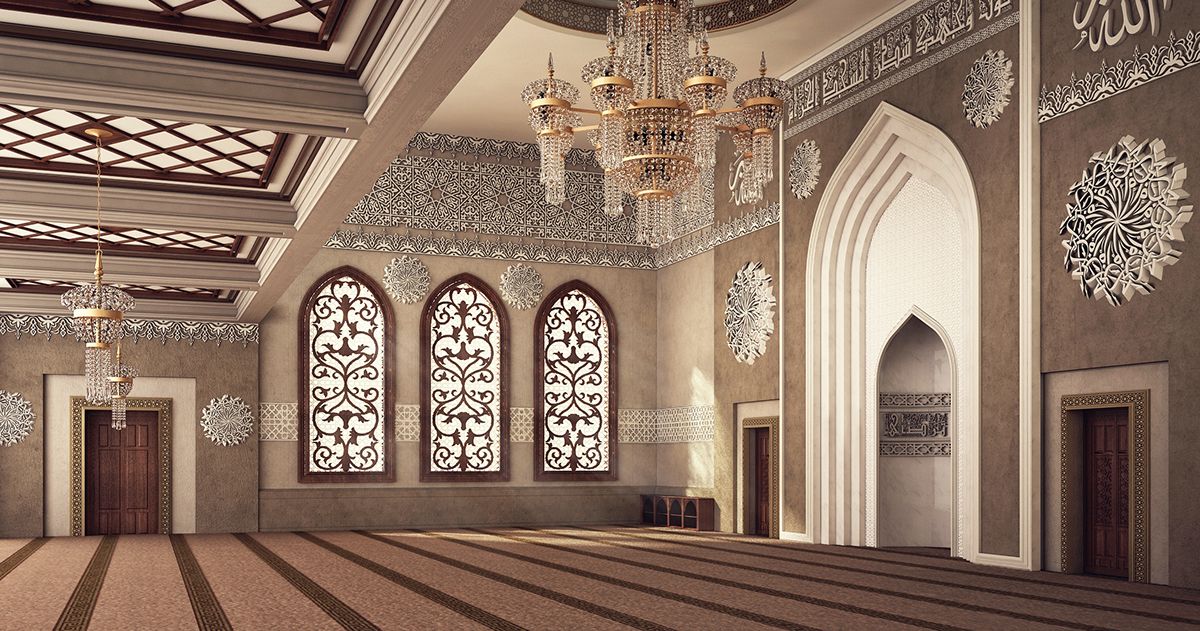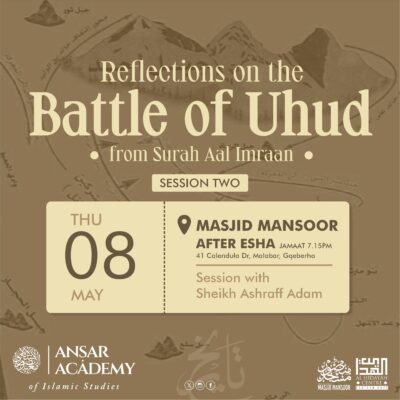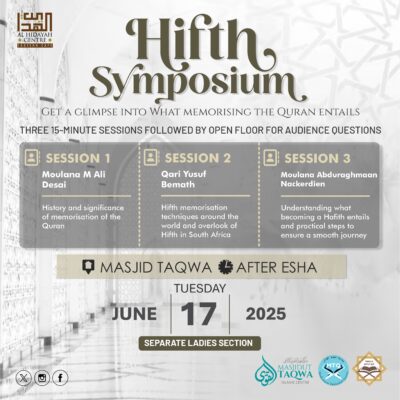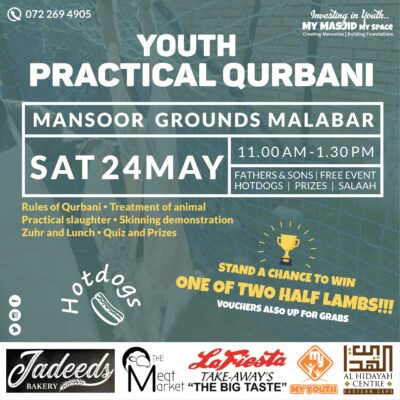Many a Muslim enjoyed the acts of worship associated with Ramadaan – Salaah, Taraweeh, fasting, reciting the Noble Quran, charity and so forth. But there were others who were falling short and some who did not even fast in the holy month. What was missing? The key ingredient, once we call ourselves Muslims, is to have strong faith (Imaan). Without that we will not feel the need to do actions that are pleasing to Allah Ta’ala.
Faith is not always on one level.
- The Noble Quran alludes to this in Surah Tawbah verse 123: “Whenever a Surah is revealed, some of them ask mockingly, “Which of you has this increased in faith?” As for the believers, it has increased them in faith and they rejoice.”
- The Hadith refers to the need for renewing one’s faith, “Your faith will wear out within you just as a shirt becomes worn out, so ask Allah Ta’ala to renew faith in your hearts.” (al-Mu’jam al-Kabir lil-Ṭabaranī 14668)
Due to this, there needs to be a constant effort to preserve and increase the levels of our faith.
- Ibn Masud radhiallahu anuhu used to say, “Sit with us, so that we may speak of things that may increase our faith.” This practice is also reported from Umar and Muaaz radhiallahu anhuma.
- Abdullah ibn Rawaha radhiallahu anhu used to take his companions by the hand and say, “Come, so that we may have faith (Imaan) for an hour. Let us remember Allah Ta’ala so that we increase in faith by obeying Him.”
- Imam Abdur Rahman Awazai rahimahullah was asked if faith increases. He replied, “Yes, until it becomes like the mountains.” He was then asked if it decreases and he said, “Yes, until there might be nothing of it left.”
Simply bringing belief in Allah Ta’ala does not mean that life will be easy. “Do people think once they say, “We believe,” that they will be left without being put to the test?” (Noble Quran, 29:2)
Tests and challenges to our faith will come in various forms:
One form of a test to our faith is where we become complacent, are content with being Muslim, and make no effort to increase our knowledge of Islam. There’s a small rural town in Australia called Mareeba which has Australia’s oldest surviving Muslim community. A small group of Albanian Muslim farmers live there, descendants of Muslims who arrived in the early 1920’s in search of a livelihood. When you see the community today, you marvel at how they have held firm to their faith with beards and scarves. The Masjid has programs and Huffaaz are being produced. It seems marvellous in how well they have preserved their faith and identity for so long, in so remote an area. The sad part is that it required a shock to the system to realise what they had in terms of faith.
In 1980 some members of the community left Islam for Christianity. This made the others realise that they were taking their faith for granted. Their lifestyle was mimicking the rest of the community – they were too busy with work, were not attending Juma or reading Salaah, they were not fasting Ramadaan and they were drinking alcohol. They started attending classes on Islam with the Imam and reminded one another of their faith through Dawah. Today the result is a strong, vibrant Islamic culture which is even drawing other non-Muslim Australians to Islam. Once they gained knowledge, they became convinced of their faith in Islam and started practicing.
The Maktab System
We realise the need for Islamic education in the form of the Maktab system and the efforts of Tabligh where we remind one another of our duty to Allah Ta’ala.
- Allamah Suyuti rahimahullah writes, “Teaching kids the Noble Quran is a fundamental duty of Islam. As a result, they will grow up with a pure nature and the light of wisdom will reach their hearts before temptations and desires overcome it and taint it with the stain of sin.”
- Ibn Khaldun rahimahullah wrote, “Teaching kids the Noble Quran is a special hallmark of Islam. Muslims held firmly to this. They structured its teaching in all Muslim cities in such a manner that faith and Islamic beliefs became entrenched in the kids’ hearts. The Noble Quran became the foundation of their knowledge, upon which the skills and talents they later acquired were based. This helped them to overcome the challenges of their teenage years.”
- We are indebted to the pioneer Muslim emigrants to South Africa who set up the Maktab system (afternoon classes for basic Islamic knowledge) which we have. Travel to a country where this is not found and ask the Muslim emigrants how tough it was for them to grow up without this system and keep their faith. When you see adults who cannot read the Kalimah or the Noble Quran, and who cannot make Wudhu correctly, you will cry tears of gratitude for the Maktab teachers who taught us and are still teaching our kids.
- Iqbal, the poet and thinker of the East, said regarding the Maktab system, “I used to think negatively about the Maktab and that Muslims should be imbued with Western, modern culture rather. After visiting Europe, I changed my opinion. Leave the Maktabs and the Ulama. Without them you will face a situation like Spain where there is little to show for 800 years of Muslim rule except for a few buildings like the Alhambra, etc. Withiut the Maktabs, India would only have the Red Fort and the Taj Mahal to show that Muslims were once there.”
How faith goes away
The problem with not having the knowledge of the Islamic way of life and as a result not being convinced that Islam’s political, educational, financial, judicial and social systems are superior, is that Muslims start to feel that other lifestyles are better and more progressive. They build an inferiority complex regarding the system of Islam.
- This happened in the Ottoman Empire over a period of time. In the Tulip Period of 1717-1730 some people under the influence of the grand vizier Ebrahim Pasha began to dress like the Europeans. The Ottoman Palace began to imitate European court life and pleasures. Sultan Ahmet II bought lavish summer residences, and parties resembling those of the French aristocracy were held. At the same time, the rise of nationalism and not a pan-Islamic identity was fuelled by Russia, Austria, and France. Muslims began to identify as Turk or Arab first. This culminated in the Arab revolt against the Ottoman Empire which shattered Muslims politically to result in the mess of arbitrary borders and micro countries we now have.
- In 1828 the turban was replaced with the Fez cap in social circles. This led to it being banned and replaced with the European hat a century later.
- The Young Turks group emerged out of all this, and they looked to Europe as a blueprint for an ideal society. The Tanzimat Period called for modernisation of Islamic Law and of making it acceptable to the West. The Young Turks pushed for Islamic laws to be replaced.
- This gradual drift to the West culminated in the arrival of Mustafa Kemal Attaturk in 1917 who overthrew the Khilafah, removed the Ottoman Sultan, replaced the Arabic script with a Latin one, banned the Fez and turban, forced the Athan to be given in Turkish for some years, replaced the guidance of the Ulama with Western science and brought women out into the public sphere.
How faith was preserved
Amidst this severe test of the faith of the people, there were still those who worked hard to preserve it. People like Bediuzzaman Saeed Nursi wrote books on Islam while in exile and had them smuggled out to the people. He in fact said that this test was a blessing for it allowed true Islam to emerge where there might have been a distorted version.
- The effect of these sacrifices and efforts to preserve faith saw Adnan Menderes become Prime Minister of Turkey in 1950. He brought back the Arabic Athan and reopened thousands of Masjids. He was executed by the military in 1960 but the spirit of faith continued to grow steadily in secret until the new current government unbanned the Hijab and Islam is once again flourishing in Turkey.
- Russia during the communist Soviet Union is another case in point. The Soviet Union had 25,000 Masjids in 1917. Under the communists only 500 remained active. Russia itself had 15,000 of those Masjids in 1917 and only 100 remained active in the years to follow. Russian Muslims preserved their faith in secret, hiding copies of the Noble Quran. The Hajj was largely stopped and there were no Maktabs except two officially controlled ones. An old lady recounts how her granny used to teach her Surah Ikhlaas in secret, telling her it was magic words. Her granny would hide and fast at the great threat of being found out. That sort of sacrifice to preserve faith in the most trying of times resulted in 8,000 Masjids being built in Russia after the fall of Communism from 1995-2015.
- In the Americas, among the slaves brought from Africa, and estimated 900,000 were Muslim with tens of thousands of these arriving in the USA. They tried, under the most difficult of circumstances, to keep their faith with prayer. Charles Bell, in his 1837 autobiography, wrote about many whom he saw praying five times a day in a language he didn’t understand which was obviously Arabic.
- Yarrow Mamout was taken as a slave in 1752 at the age of 16 to America. After 44 years of slavery, he was freed and bought a house in Washington. He was often seen praising Allah Ta’ala according to Charles Peale. Throughout his life he told people not to eat pork or drink alcohol.
- Omar bin Said was born in Senegal in 1770. He passed away in 1863 in North Carolina, USA after 56 years in slavery. He was a Muslim scholar and wrote books on Fiqh in Arabic, together with Surahs of the Noble Quran.
This was how these people passed the test to their faith.
With the increasing challenges to our faith in the form of being attracted to the non-Muslim way of life through social media, movies and the people around us, we need to prioritise working on strengthening our faith. We need to be confident in the wisdom of Islamic teachings in all spheres of life as compared to other lifestyles.
A proposal was given by the Prophet sallallahu alaihi wa sallam on behalf of Julaibeeb radhiallahu anhu for an Ansaari girl. She was known for her beauty, modesty and piety. Her parents said that they needed to consult before giving an answer. She on the other hand said that if it is a request from the Prophet sallallahu alaihi wa sallam there will only be goodness in it and no harm for me. The Prophet sallallahu alaihi wa sallam made Dua for them and their house was full of blessings and lacked for nothing. When Julaibeeb radhiallahu anhu was martyred, the Prophet sallallahu alaihi wa sallam enshrouded him personally, and his wife became the most sought-after widow in Madinah Munawwarah.
“It is not for a believing man or woman, when Allah and His Messenger decree a matter, to have any other choice in that matter.” (Noble Quran 33:36)
Build confidence in Islam through study. Do actions that will strengthen our faith. Help others find and preserve their faith. Attend the gatherings of Imaan to refresh our faith. Join the Tabligh programs and classes on Islam. Supporting one another in building our faith and equipping ourselves with the Islamic tools is critical to meet the ever-intensifying challenges to our faith. Gaza is testament to the fruits of building faith; despite facing ongoing genocide, slaughter, starvation and being abandoned by the world, we still see them praising Allah Ta’ala, reading Salaah amidst the ruins of Masjids and reciting the Noble Quran.
Build faith and it will stand by us in times of despair and anguish.









COMMENTS